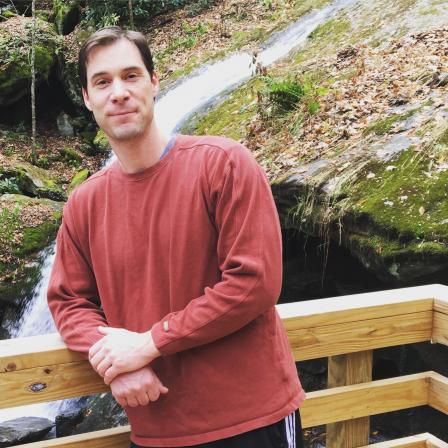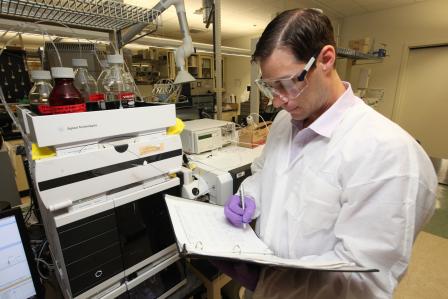Meet EPA Scientist Jon Sobus, Ph.D.
 Meet EPA scientist Dr. Jon Sobus!Dr. Jon Sobus researches how chemical exposures may accumulate in the body over time and the potential cumulative impact of these exposures on human health. Dr. Sobus recently received the prestigious Presidential Early Career Award for Scientists and Engineers (PECASE), the highest honor bestowed by the United States Government to outstanding scientists and engineers who are beginning their independent research careers and who show exceptional promise for leadership in science and technology.
Meet EPA scientist Dr. Jon Sobus!Dr. Jon Sobus researches how chemical exposures may accumulate in the body over time and the potential cumulative impact of these exposures on human health. Dr. Sobus recently received the prestigious Presidential Early Career Award for Scientists and Engineers (PECASE), the highest honor bestowed by the United States Government to outstanding scientists and engineers who are beginning their independent research careers and who show exceptional promise for leadership in science and technology.
What kind of research do you do at EPA?
In a nutshell, chemicals are everywhere - in our homes, in our food, in our water, in the air, in us, etc. We don’t have a great handle on which chemicals are where, and whether some might be bad actors. A big part of my job is figuring out how to find chemicals of potential concern having only limited knowledge about where and for what to look. It’s like those magic eye pictures from the 90’s where you can’t see the hidden image until you soften your gaze.
What is your background?
Jack of all trades, master of none. My degree is in Environmental Sciences and Engineering, but I spend the bulk of my time doing (or at least thinking about) analytical chemistry, biostatistics, and environmental epidemiology.
When did you first know you wanted to be a scientist?
I’ve wanted to be a scientist since elementary school. For as long as I can remember, I was always quite bored in most of my non-science classes. Thankfully, I had some great teachers and mentors in my formative years. They helped me understand that a career in research was an actual thing and encouraged me to pursue higher education. Graduate school really opened my eyes to a life of being professionally pensive.
What do you like most about your research?
It’s a four-way tie: 1) Every day is different; 2) It’s fun to solve hard problems; 3) It’s satisfying to do work that makes a difference; 4) I have colleagues that I deeply respect and enjoy!
How does your science matter?
Simply put, the field of research to which I contribute has the potential to affect how chemicals are produced, used, and disposed of. This has dramatic implications on human and ecological health and sustainability. Our success as researchers depends on our ability to innovate, motivate, collaborate, and communicate. I try to do these four things every day.
If you weren’t a scientist, what would you be doing?
Automobile design. I’m somewhat obsessed with cars. I do feel a calling to be more altruistic, but cars are so freakin’ cool.
 Dr. Sobus in the lab. What advice would you give a student interested in a career in science?
Dr. Sobus in the lab. What advice would you give a student interested in a career in science?
Step 1: Understand that a career in science is achievable and laudable;
Step 2: Find a good mentor or two (or as many as you can) and listen;
Step 3: Recognize that anyone can make a global impact;
Step 4: Put in the honest work to affect the desired outcome;
Step 5: Balance being a good person with being a successful professional
If you can have any superpower, what would you choose?
Let’s first all agree that flight is always #1. Also, teleportation is a perennial top 5. That being said, how about the ability to always communicate (words, facial expression, physical contact) exactly what is needed in any given moment? The human experience is, in my opinion, influenced most heavily by interpersonal interaction. Each person therefore has the ability drastically affect the attitude and actions of those around them. Imagine if you could always communicate to another person exactly what they needed to see, hear or feel in a given moment. That would be an amazing gift! Superpower or not, it’s a worthy aspiration, and certainly less lofty than flight.
What do you think the coolest scientific discovery was and why?
The value of scientific discovery is understanding - and not just for the sake of knowledge, but to alter the course of an otherwise certain outcome. In this sense, the coolest scientific discovery is the one that most shapes your personal life experience. In my case, it’s a tie between Swedish Fish and jeans that stretch.
If you could have dinner with any scientist, past or present, who would you choose?
As far as a well-known scientific figure, I’d have to go with Carl Sagan. It’s a rare thing to be both affable and brilliant, and I think he’d be able to blow my mind and still shoot the breeze. That being said, I work with some amazing people, and cherish our rare opportunities for unencumbered social outings. I’d really like to spend more time with colleagues I admire and enjoy, even if it involves karaoke.
Editor's Note: The opinions expressed herein are those of the researcher alone. EPA does not endorse the opinions or positions expressed.
